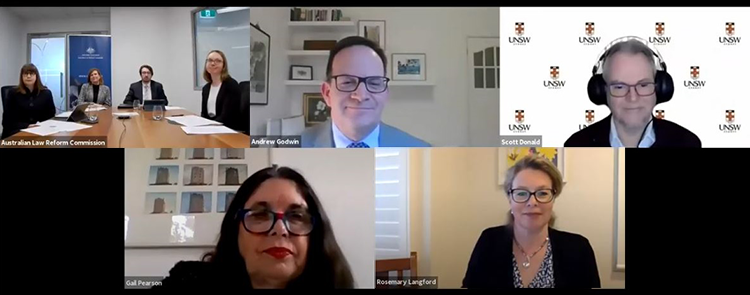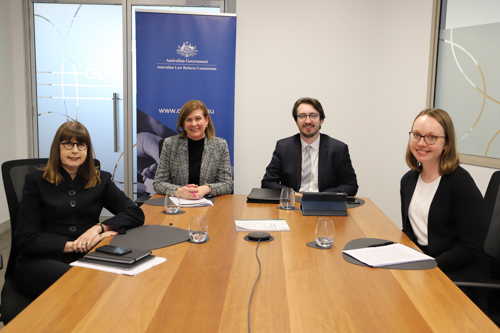29.07.2021
On Tuesday 20 July 2021, the Australian Law Reform Commission, in partnership with Melbourne Law School, hosted a webinar to launch the Company and Securities Law Journal Special Issue: Financial Services Laws – Understanding the Devil in the Detail.

Professor Pip Nicholson
Dean of Melbourne Law School, Professor Pip Nicholson, provided the welcome for the event and noted that the articles in the special issue reflect the collaboration of the ALRC with leading legal academics from Melbourne Law School and other universities across Australia, as part of the ALRC’s current Inquiry into financial services legislation in Australia.
The Hon Justice Sarah Derrington, President of the ALRC, officially launched the special issue and offered some insights into the legislative mapping that provided the impetus for the special issue. Justice Derrington highlighted how the detailed work undertaken by the ALRC reflects recommendations made by Commissioner Hayne as part of the Royal Commission into Misconduct in the Banking, Superannuation and Financial Services Industry.

Edmund Finnane
Edmund Finnane, Editor of the Company and Securities Law Journal (CSLJ), offered reflections on the evolution of commentary on financial services regulation in the CSLJ in tandem with key developments in this area of law.
Associate Professor Rosemary Teele Langford from Melbourne Law School provided the keynote address, commenting on the state of corporations law in Australia and on further research being undertaken in this area. Rosemary’s comments also addressed three key propositions in relation to legislative design, as canvassed in her joint article with Dr Andrew Godwin, Team Leader and Special Counsel for the ALRC financial services legislation review, and Associate Professor Vivienne Brand at Flinders University College of Business, Government and Law.

(L-R top) Justice SC Derrington, Cindy Davies, Samuel Walpole, Phoebe Tapley, Dr Andrew Godwin, Associate Professor Scott Donald (L-R bottom) Professor Gail Pearson, Associate Professor Rosemary Langford
Justice Derrington then invited the panel to discuss some of the cross-cutting themes from the journal articles, including the interaction between the Corporations Act 2001 (Cth) and other sources of law; duplication and inconsistencies in the law; and the benefits of separate regulation versus consolidation.
Samuel Walpole, Barrister and ALRC Legal Consultant, reflected on the interaction between general law and statutory duties, drawing on the article he co-authored with Associate Professors Rosemary Teele Langford and Scott Donald, ‘Regulating for Loyalty in the Financial Services Industry’.
ALRC Legal Officer Phoebe Tapley’s remarks addressed the distinctive role and volume of delegated legislation affecting financial product disclosure requirements under the Corporations Act 2001 (Cth). Phoebe co-authored ‘Disclosure (Dis)content: Regulating Disclosure in Prospectuses and Product Disclosure Statements’ with Dr Andrew Godwin.
 Cindy Davies, ALRC Legal Officer, discussed inconsistencies and overlaps in the three licensing regimes analysed in her article with Samuel Walpole and Professor Gail Pearson: ‘Australia’s Licensing Regimes for Financial Services, Credit, and Superannuation: Three Tracks toward the Twin Peaks’.
Cindy Davies, ALRC Legal Officer, discussed inconsistencies and overlaps in the three licensing regimes analysed in her article with Samuel Walpole and Professor Gail Pearson: ‘Australia’s Licensing Regimes for Financial Services, Credit, and Superannuation: Three Tracks toward the Twin Peaks’.
UNSW Law Associate Professor Scott Donald’s observations illuminated the implications of variations in the way conflicts of interest are regulated in different sectors of the financial services industry, foreshadowing the conclusions reached in his joint article with Samuel and Rosemary.
Professor Gail Pearson from the University of Sydney Business School built upon Cindy’s earlier analysis by highlighting distinctive aspects of the regulation of superannuation that mitigate against integration of the licensing regimes for financial services providers and Registerable Superannuation Entities at this time.
By contrast, Andrew Godwin discussed why, in the case of disclosure requirements for financial products and securities, the benefits of consolidation may outweigh the benefits of separate regulation.
The panel discussion concluded with questions from the audience, addressing recent trends in amendments to corporations and financial services laws.
The recording of the webinar can be accessed via the University of Melbourne.
Articles from the special issue are available from Thomson Reuters (paywall applies). Thomson Reuters kindly provided access to the articles for webinar attendees until Monday 26 July 2021.
